The nearest star from our solar system is 4.29 light year away. How much is this distance in terms of par sec? How much parallax would this star (named Alpha Centauri) show when viewed from two locations of the earth six months apart in its orbit around the sun?
To solve the problem step by step, we will first convert the distance from light years to parsecs and then calculate the parallax angle for Alpha Centauri.
Step 1: Convert Light Years to Meters
We know that:
1 light year = 9.46×1015 meters.
Given the distance to Alpha Centauri is 4.29 light years, we can calculate the distance in meters:
Distance=4.29light years×9.46×1015meters/light year
Distance=4.29×9.46×1015≈4.058×1016meters
Step 2: Convert Meters to Parsecs
We know that:
1 parsec = 3.08×1016 meters.
Now we convert the distance from meters to parsecs:
Distance in parsecs=4.058×1016meters3.08×1016meters/parsec
Distance in parsecs≈1.32parsecs
Step 3: Calculate the Parallax Angle
The parallax angle (in arcseconds) for an object at a distance of 1 parsec is defined as 1 arcsecond when viewed from two points that are 1 astronomical unit (AU) apart. The distance between the two points (the diameter of Earth's orbit) when viewed six months apart is approximately 2 AU.
Given that the parallax angle for 1 parsec is 1 arcsecond, the parallax angle for Alpha Centauri can be calculated as follows:
Parallax angle=1.32parsecs×2arcseconds
Parallax angle≈2.64arcseconds
Final Answer
The distance to Alpha Centauri in parsecs is approximately 1.32 parsecs, and the parallax angle is approximately 2.64 arcseconds.
---
We know that:
1 light year = 9.46×1015 meters.
Distance=4.29light years×9.46×1015meters/light year
Distance=4.29×9.46×1015≈4.058×1016meters
We know that:
1 parsec = 3.08×1016 meters.
Distance in parsecs=4.058×1016meters3.08×1016meters/parsec
Distance in parsecs≈1.32parsecs
The parallax angle (in arcseconds) for an object at a distance of 1 parsec is defined as 1 arcsecond when viewed from two points that are 1 astronomical unit (AU) apart. The distance between the two points (the diameter of Earth's orbit) when viewed six months apart is approximately 2 AU.
Parallax angle=1.32parsecs×2arcseconds
Parallax angle≈2.64arcseconds
The distance to Alpha Centauri in parsecs is approximately 1.32 parsecs, and the parallax angle is approximately 2.64 arcseconds.
Topper's Solved these Questions
- UNITSBook:ICSEChapter:UNITSExercise:MODULE 1 (CONCEPTUAL SHORT ANSWER QUESTIONS WITH ANSWERS)
Explore 5 Videos
- UNITSBook:ICSEChapter:UNITSExercise:MODULE 1 (LONG ANSWER QUESTIONS)
Explore 3 Videos
- THERMAL RADIATION Book:ICSEChapter:THERMAL RADIATION Exercise:SELECTED PROBLEMS (from WIEN.S DISPLACEMENT LAW)
Explore 14 Videos
- VECTORS SCALARS ELEMENTARY CALCULUS Book:ICSEChapter:VECTORS SCALARS ELEMENTARY CALCULUS Exercise:UNSOLVED PROBLEMS
Explore 79 Videos
Similar Questions
The earth takes 24 hours to rotate once about its axis. How much time (in min) does the sun take to shift by 1∘ when viewed from the earth?
View SolutionLet a star be much brighter than our sun but its mass is same as that of sun If our earth has average lift span of man as 70years In the earth like planet of this star system having double the distance from our star find the average lift span of a man on this planet in terms of our year
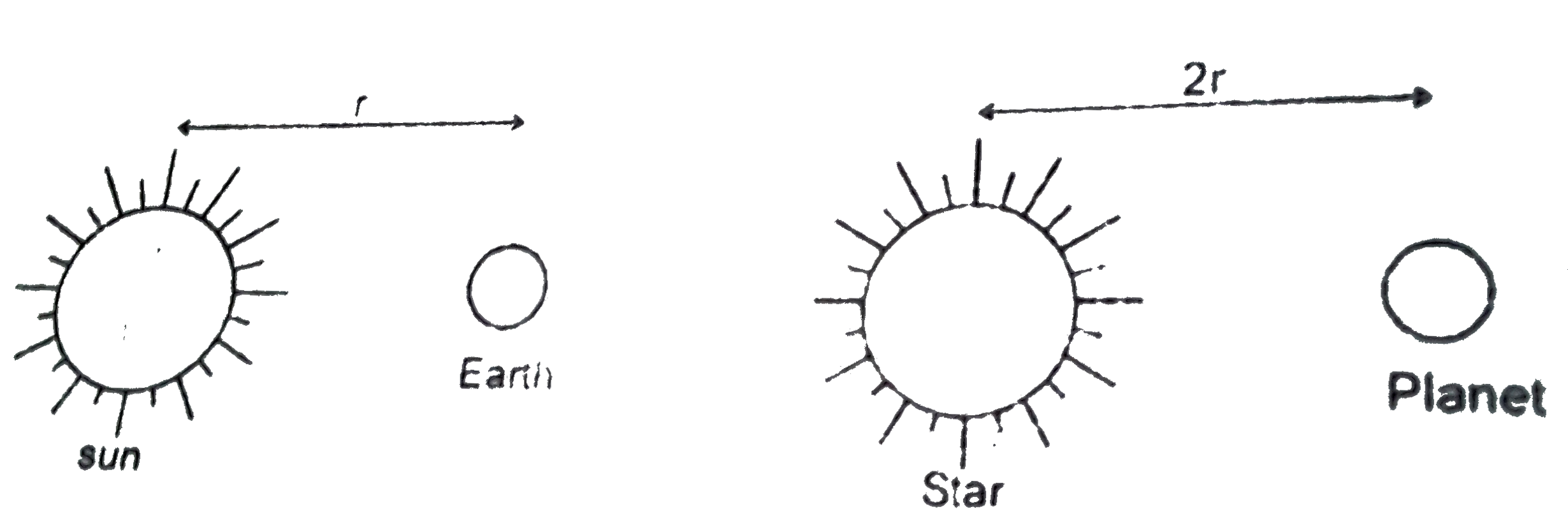 .
.
View Solution
Knowledge Check
This passage is adapted from Iain King, “Can Economics Be Ethical?” ©2013 by Prospect Publishing.
Recent debates about the economy have rediscovered the question, “is that right?”, where “right” means more than just profits or efficiency.
Some argue that because the free markets allow for personal choice, they are already ethical. Others have accepted the ethical critique and embraced corporate social responsibility. But before we can label any market outcome as “immoral,” or sneer at economists who try to put a price on being ethical, we need to be clear on what we are talking about.
There are different views on where ethics should apply when someone makes an economic decision. Consider Adam Smith, widely regarded as the founder of modern economics. He was a moral philosopher who believed sympathy for others was the basis for ethics (we would call it empathy nowadays). But one of his key insights in The Wealth of Nations was that acting on this empathy could be counter-productive—he observed people becoming better off when they put their own empathy aside, and interacted in a self-interested way. Smith justifies selfish behavior by the outcome. Whenever planners use cost-benefit analysis to justify a new railway line, or someone retrains to boost his or her earning power, or a shopper buys one to get one free, they are using the same approach: empathizing with someone, and seeking an outcome that makes that person as well off as possible—although the person they are empathizing with may be themselves in the future.
Instead of judging consequences, Aristotle said ethics was about having the right character—displaying virtues like courage and honesty. It is a view put into practice whenever business leaders are chosen for their good character. But it is a hard philosophy to teach—just how much loyalty should you show to a manufacturer that keeps losing money? Show too little and you’re a “greed is good” corporate raider, too much and you’re wasting money on unproductive capital. Aristotle thought there was a golden mean between the two extremes, and finding it was a matter of fine judgment. But if ethics is about character, it’s not clear what those characteristics should be.
There is yet another approach: instead of rooting ethics in character or the consequences of actions, we can focus on our actions themselves. From this perspective some things are right, some wrong—we should buy fair trade goods, we shouldn’t tell lies in advertisements. Ethics becomes a list of commandments, a catalog of “dos” and “don’ts.”
When a finance official refuses to devalue a currency because they have promised not to, they are defining ethics this way. According to this approach devaluation can still be bad, even if it would make everybody better off.
Many moral dilemmas arise when these three versions pull in different directions but clashes are not inevitable. Take fair trade coffee (coffee that is sold with a certification that indicates the farmers and workers who produced it were paid a fair wage), for example: buying it might have good consequences, be virtuous, and also be the right way to act in a flawed market. Common ground like this suggests that, even without agreement on where ethics applies, ethical economics is still possible.
Whenever we feel queasy about “perfect” competitive markets, the problem is often rooted in a phony conception of people. The model of man on which classical economics is based—an entirely rational and selfish being—is a parody, as John Stuart Mill, the philosopher who pioneered the model, accepted. Most people—even economists— now accept that this “economic man” is a fiction. We behave like a herd, we fear losses more than we hope for gains, rarely can our brains process all the relevant facts.
These human quirks mean we can never make purely “rational” decisions. A new wave of behavioral economists, aided by neuroscientists, is trying to understand our psychology, both alone and in groups, so they can anticipate our decisions in the marketplace more accurately. But psychology can also help us understand why we react in disgust at economic injustice, or accept a moral law as universal. Which means that the relatively new science of human behavior might also define ethics for us. Ethical economics would then emerge from one of the least likely places: economists themselves.
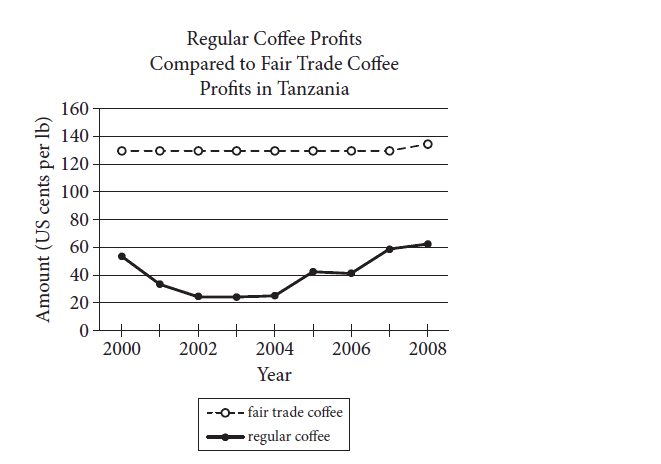
Adapted from the Fair Trade Vancouver website.
In the passage, the author anticipates which of the following objections to criticizing the ethics of freemarkets?ASmith’s association of free markets with ethical behavior still applies today.BFree markets are the best way to generate high profits, so ethics are a secondary consideration.CFree markets are ethical because they are made possible by devalued currency.DFree markets are ethical because they enable individuals to make choices.This passage is adapted from Iain King, “Can Economics Be Ethical?” ©2013 by Prospect Publishing.
Recent debates about the economy have rediscovered the question, “is that right?”, where “right” means more than just profits or efficiency.
Some argue that because the free markets allow for personal choice, they are already ethical. Others have accepted the ethical critique and embraced corporate social responsibility. But before we can label any market outcome as “immoral,” or sneer at economists who try to put a price on being ethical, we need to be clear on what we are talking about.
There are different views on where ethics should apply when someone makes an economic decision. Consider Adam Smith, widely regarded as the founder of modern economics. He was a moral philosopher who believed sympathy for others was the basis for ethics (we would call it empathy nowadays). But one of his key insights in The Wealth of Nations was that acting on this empathy could be counter-productive—he observed people becoming better off when they put their own empathy aside, and interacted in a self-interested way. Smith justifies selfish behavior by the outcome. Whenever planners use cost-benefit analysis to justify a new railway line, or someone retrains to boost his or her earning power, or a shopper buys one to get one free, they are using the same approach: empathizing with someone, and seeking an outcome that makes that person as well off as possible—although the person they are empathizing with may be themselves in the future.
Instead of judging consequences, Aristotle said ethics was about having the right character—displaying virtues like courage and honesty. It is a view put into practice whenever business leaders are chosen for their good character. But it is a hard philosophy to teach—just how much loyalty should you show to a manufacturer that keeps losing money? Show too little and you’re a “greed is good” corporate raider, too much and you’re wasting money on unproductive capital. Aristotle thought there was a golden mean between the two extremes, and finding it was a matter of fine judgment. But if ethics is about character, it’s not clear what those characteristics should be.
There is yet another approach: instead of rooting ethics in character or the consequences of actions, we can focus on our actions themselves. From this perspective some things are right, some wrong—we should buy fair trade goods, we shouldn’t tell lies in advertisements. Ethics becomes a list of commandments, a catalog of “dos” and “don’ts.”
When a finance official refuses to devalue a currency because they have promised not to, they are defining ethics this way. According to this approach devaluation can still be bad, even if it would make everybody better off.
Many moral dilemmas arise when these three versions pull in different directions but clashes are not inevitable. Take fair trade coffee (coffee that is sold with a certification that indicates the farmers and workers who produced it were paid a fair wage), for example: buying it might have good consequences, be virtuous, and also be the right way to act in a flawed market. Common ground like this suggests that, even without agreement on where ethics applies, ethical economics is still possible.
Whenever we feel queasy about “perfect” competitive markets, the problem is often rooted in a phony conception of people. The model of man on which classical economics is based—an entirely rational and selfish being—is a parody, as John Stuart Mill, the philosopher who pioneered the model, accepted. Most people—even economists— now accept that this “economic man” is a fiction. We behave like a herd, we fear losses more than we hope for gains, rarely can our brains process all the relevant facts.
These human quirks mean we can never make purely “rational” decisions. A new wave of behavioral economists, aided by neuroscientists, is trying to understand our psychology, both alone and in groups, so they can anticipate our decisions in the marketplace more accurately. But psychology can also help us understand why we react in disgust at economic injustice, or accept a moral law as universal. Which means that the relatively new science of human behavior might also define ethics for us. Ethical economics would then emerge from one of the least likely places: economists themselves.
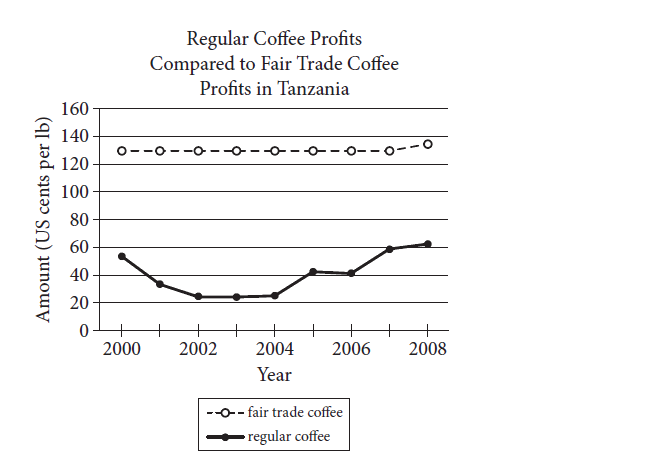
Adapted from the Fair Trade Vancouver website.
Data in the graph about per-pound coffee profits in Tanzania most strongly support which of the following statements?AFair trade coffee consistently earned greater profits than regular coffee earned.BThe profits earned from regular coffee did not fluctuate.CFair trade coffee profits increased between 2004 and 2006.DFair trade and regular coffee were earning equal profits by 2008.This passage is adapted from Iain King, “Can Economics Be Ethical?” ©2013 by Prospect Publishing.
Recent debates about the economy have rediscovered the question, “is that right?”, where “right” means more than just profits or efficiency.
Some argue that because the free markets allow for personal choice, they are already ethical. Others have accepted the ethical critique and embraced corporate social responsibility. But before we can label any market outcome as “immoral,” or sneer at economists who try to put a price on being ethical, we need to be clear on what we are talking about.
There are different views on where ethics should apply when someone makes an economic decision. Consider Adam Smith, widely regarded as the founder of modern economics. He was a moral philosopher who believed sympathy for others was the basis for ethics (we would call it empathy nowadays). But one of his key insights in The Wealth of Nations was that acting on this empathy could be counter-productive—he observed people becoming better off when they put their own empathy aside, and interacted in a self-interested way. Smith justifies selfish behavior by the outcome. Whenever planners use cost-benefit analysis to justify a new railway line, or someone retrains to boost his or her earning power, or a shopper buys one to get one free, they are using the same approach: empathizing with someone, and seeking an outcome that makes that person as well off as possible—although the person they are empathizing with may be themselves in the future.
Instead of judging consequences, Aristotle said ethics was about having the right character—displaying virtues like courage and honesty. It is a view put into practice whenever business leaders are chosen for their good character. But it is a hard philosophy to teach—just how much loyalty should you show to a manufacturer that keeps losing money? Show too little and you’re a “greed is good” corporate raider, too much and you’re wasting money on unproductive capital. Aristotle thought there was a golden mean between the two extremes, and finding it was a matter of fine judgment. But if ethics is about character, it’s not clear what those characteristics should be.
There is yet another approach: instead of rooting ethics in character or the consequences of actions, we can focus on our actions themselves. From this perspective some things are right, some wrong—we should buy fair trade goods, we shouldn’t tell lies in advertisements. Ethics becomes a list of commandments, a catalog of “dos” and “don’ts.”
When a finance official refuses to devalue a currency because they have promised not to, they are defining ethics this way. According to this approach devaluation can still be bad, even if it would make everybody better off.
Many moral dilemmas arise when these three versions pull in different directions but clashes are not inevitable. Take fair trade coffee (coffee that is sold with a certification that indicates the farmers and workers who produced it were paid a fair wage), for example: buying it might have good consequences, be virtuous, and also be the right way to act in a flawed market. Common ground like this suggests that, even without agreement on where ethics applies, ethical economics is still possible.
Whenever we feel queasy about “perfect” competitive markets, the problem is often rooted in a phony conception of people. The model of man on which classical economics is based—an entirely rational and selfish being—is a parody, as John Stuart Mill, the philosopher who pioneered the model, accepted. Most people—even economists— now accept that this “economic man” is a fiction. We behave like a herd, we fear losses more than we hope for gains, rarely can our brains process all the relevant facts.
These human quirks mean we can never make purely “rational” decisions. A new wave of behavioral economists, aided by neuroscientists, is trying to understand our psychology, both alone and in groups, so they can anticipate our decisions in the marketplace more accurately. But psychology can also help us understand why we react in disgust at economic injustice, or accept a moral law as universal. Which means that the relatively new science of human behavior might also define ethics for us. Ethical economics would then emerge from one of the least likely places: economists themselves.
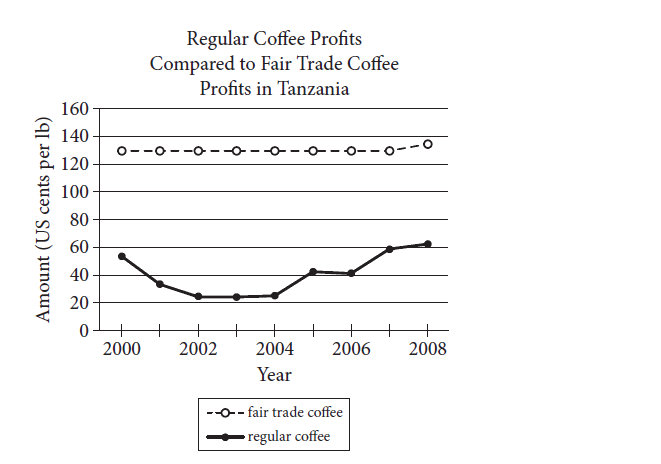
Adapted from the Fair Trade Vancouver website.
As used in line 6, “embraced” most nearly meansAlovingly held.Breadily adopted.Ceagerly hugged.Dreluctantly used.
A par sec is a convenient unit of length on the astronomical scale. It is the distance o an object that will show a parallax of 1 s of arc from opposite ends of a base line equal to the distance from the earth to the sun. How much is a sec in terms of metre?
View SolutionConsider a spacecraft in an elliptical orbit around the earth At the lowest point or perigee of its orbit it is 300km above the earth's surface at the highest point or apogee it is 3000km above the earth surface
(a) What is the period of the spacecraft's orbit
(b) using conservation of angular momentum find the ratio of spacecraft's speed at perigee to its speed at apogee
(c) Using conservation of energy find the speed at perigee and the speed at apogee
(d) it is derised to have the spacecraft escape from the earth completrly if the spacecraft's rockets are fired at perigee by how much would the speed have to be increased to achieve this? What if the rockets were fired at apogee Which point in the orbit is the most efficient to use ?
View SolutionTwo point charges q and - q are located at points (0 , 0 , - a ) and (0 , 0 , a) respectively :
(a) Find the electrostatic potential at (0 , 0 , z) and ( x, y , 0).
(b) How much work is done in moving a small test charge from the point (5 , 0 , 0 , ) to (-7 , 0 , 0 ) along the x - axis ?
(c) How would your answer change if the path of the test charge between the same points is not along the x axis but along any other random path ?
(d) If the above point charges are now placed in the same position in a uniform external electric field →E , what would be the potential energy of the charge system in its orientation of unstable equilibrium ? Justify your answer in each case .
View SolutionThis passage is adapted from Iain King, “Can Economics Be Ethical?” ©2013 by Prospect Publishing.
Recent debates about the economy have rediscovered the question, “is that right?”, where “right” means more than just profits or efficiency.
Some argue that because the free markets allow for personal choice, they are already ethical. Others have accepted the ethical critique and embraced corporate social responsibility. But before we can label any market outcome as “immoral,” or sneer at economists who try to put a price on being ethical, we need to be clear on what we are talking about.
There are different views on where ethics should apply when someone makes an economic decision. Consider Adam Smith, widely regarded as the founder of modern economics. He was a moral philosopher who believed sympathy for others was the basis for ethics (we would call it empathy nowadays). But one of his key insights in The Wealth of Nations was that acting on this empathy could be counter-productive—he observed people becoming better off when they put their own empathy aside, and interacted in a self-interested way. Smith justifies selfish behavior by the outcome. Whenever planners use cost-benefit analysis to justify a new railway line, or someone retrains to boost his or her earning power, or a shopper buys one to get one free, they are using the same approach: empathizing with someone, and seeking an outcome that makes that person as well off as possible—although the person they are empathizing with may be themselves in the future.
Instead of judging consequences, Aristotle said ethics was about having the right character—displaying virtues like courage and honesty. It is a view put into practice whenever business leaders are chosen for their good character. But it is a hard philosophy to teach—just how much loyalty should you show to a manufacturer that keeps losing money? Show too little and you’re a “greed is good” corporate raider, too much and you’re wasting money on unproductive capital. Aristotle thought there was a golden mean between the two extremes, and finding it was a matter of fine judgment. But if ethics is about character, it’s not clear what those characteristics should be.
There is yet another approach: instead of rooting ethics in character or the consequences of actions, we can focus on our actions themselves. From this perspective some things are right, some wrong—we should buy fair trade goods, we shouldn’t tell lies in advertisements. Ethics becomes a list of commandments, a catalog of “dos” and “don’ts.”
When a finance official refuses to devalue a currency because they have promised not to, they are defining ethics this way. According to this approach devaluation can still be bad, even if it would make everybody better off.
Many moral dilemmas arise when these three versions pull in different directions but clashes are not inevitable. Take fair trade coffee (coffee that is sold with a certification that indicates the farmers and workers who produced it were paid a fair wage), for example: buying it might have good consequences, be virtuous, and also be the right way to act in a flawed market. Common ground like this suggests that, even without agreement on where ethics applies, ethical economics is still possible.
Whenever we feel queasy about “perfect” competitive markets, the problem is often rooted in a phony conception of people. The model of man on which classical economics is based—an entirely rational and selfish being—is a parody, as John Stuart Mill, the philosopher who pioneered the model, accepted. Most people—even economists— now accept that this “economic man” is a fiction. We behave like a herd, we fear losses more than we hope for gains, rarely can our brains process all the relevant facts.
These human quirks mean we can never make purely “rational” decisions. A new wave of behavioral economists, aided by neuroscientists, is trying to understand our psychology, both alone and in groups, so they can anticipate our decisions in the marketplace more accurately. But psychology can also help us understand why we react in disgust at economic injustice, or accept a moral law as universal. Which means that the relatively new science of human behavior might also define ethics for us. Ethical economics would then emerge from one of the least likely places: economists themselves.
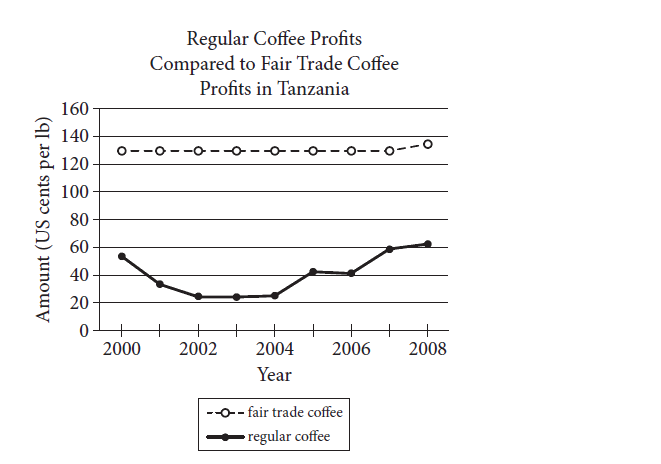
Adapted from the Fair Trade Vancouver website.
The main purpose of the passage is to
View SolutionThis passage is adapted from Iain King, “Can Economics Be Ethical?” ©2013 by Prospect Publishing.
Recent debates about the economy have rediscovered the question, “is that right?”, where “right” means more than just profits or efficiency.
Some argue that because the free markets allow for personal choice, they are already ethical. Others have accepted the ethical critique and embraced corporate social responsibility. But before we can label any market outcome as “immoral,” or sneer at economists who try to put a price on being ethical, we need to be clear on what we are talking about.
There are different views on where ethics should apply when someone makes an economic decision. Consider Adam Smith, widely regarded as the founder of modern economics. He was a moral philosopher who believed sympathy for others was the basis for ethics (we would call it empathy nowadays). But one of his key insights in The Wealth of Nations was that acting on this empathy could be counter-productive—he observed people becoming better off when they put their own empathy aside, and interacted in a self-interested way. Smith justifies selfish behavior by the outcome. Whenever planners use cost-benefit analysis to justify a new railway line, or someone retrains to boost his or her earning power, or a shopper buys one to get one free, they are using the same approach: empathizing with someone, and seeking an outcome that makes that person as well off as possible—although the person they are empathizing with may be themselves in the future.
Instead of judging consequences, Aristotle said ethics was about having the right character—displaying virtues like courage and honesty. It is a view put into practice whenever business leaders are chosen for their good character. But it is a hard philosophy to teach—just how much loyalty should you show to a manufacturer that keeps losing money? Show too little and you’re a “greed is good” corporate raider, too much and you’re wasting money on unproductive capital. Aristotle thought there was a golden mean between the two extremes, and finding it was a matter of fine judgment. But if ethics is about character, it’s not clear what those characteristics should be.
There is yet another approach: instead of rooting ethics in character or the consequences of actions, we can focus on our actions themselves. From this perspective some things are right, some wrong—we should buy fair trade goods, we shouldn’t tell lies in advertisements. Ethics becomes a list of commandments, a catalog of “dos” and “don’ts.”
When a finance official refuses to devalue a currency because they have promised not to, they are defining ethics this way. According to this approach devaluation can still be bad, even if it would make everybody better off.
Many moral dilemmas arise when these three versions pull in different directions but clashes are not inevitable. Take fair trade coffee (coffee that is sold with a certification that indicates the farmers and workers who produced it were paid a fair wage), for example: buying it might have good consequences, be virtuous, and also be the right way to act in a flawed market. Common ground like this suggests that, even without agreement on where ethics applies, ethical economics is still possible.
Whenever we feel queasy about “perfect” competitive markets, the problem is often rooted in a phony conception of people. The model of man on which classical economics is based—an entirely rational and selfish being—is a parody, as John Stuart Mill, the philosopher who pioneered the model, accepted. Most people—even economists— now accept that this “economic man” is a fiction. We behave like a herd, we fear losses more than we hope for gains, rarely can our brains process all the relevant facts.
These human quirks mean we can never make purely “rational” decisions. A new wave of behavioral economists, aided by neuroscientists, is trying to understand our psychology, both alone and in groups, so they can anticipate our decisions in the marketplace more accurately. But psychology can also help us understand why we react in disgust at economic injustice, or accept a moral law as universal. Which means that the relatively new science of human behavior might also define ethics for us. Ethical economics would then emerge from one of the least likely places: economists themselves.
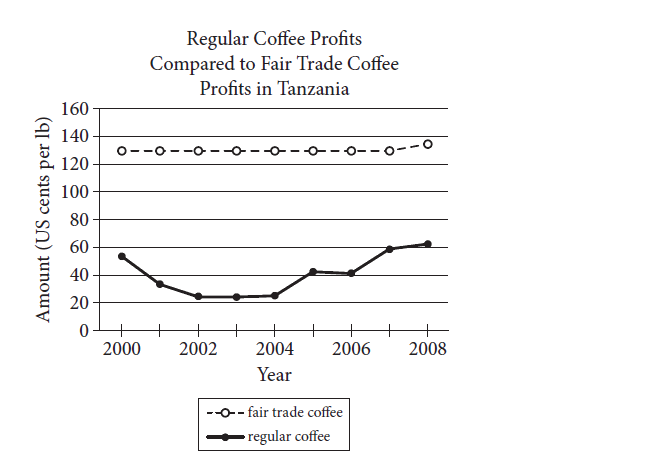
Adapted from the Fair Trade Vancouver website.
Which choice provides the best evidence for the answer to the previous question?
View Solution

